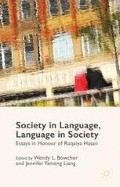Abstract
What is the semantic ‘shape’ of the instructional context construed by mothers in interaction with their preschool-age children, and how is it recognized? These questions describe, informally and succinctly, the issues addressed here. It may be said that in the life of the individual cultural initiate (the young child) all contexts are contexts for learning. The question may then be asked: what is meant by ‘instructional’ context and what is distinctive about it?
Access this chapter
Tax calculation will be finalised at checkout
Purchases are for personal use only
Preview
Unable to display preview. Download preview PDF.
References
Bernstein, B. (1971) Class, Codes and Control, Vol. I: Theoretical Studies towards a Sociology of Language (London: Routledge).
Bernstein, B. (1990) Class, Codes and Control, Vol. IV: The Structuring of Pedagogic Discourse (London: Routledge).
Cloran, C. (1994) Rhetorical Unit and Decontextualisation: an Enquiry into Some Relations of Context, Meaning and Grammar. Monographs in Systemic Functional Linguistics, No. 6 (Nottingham: Department of English Studies, University of Nottingham).
Cloran, C. (1999) ‘Contexts for learning’. In F. Christie (ed.) Pedagogy and the Shaping of Consciousness: Linguistic and Social Processes (London: Cassell), pp. 31–65.
Hasan, R. (1978) ‘Text in the systemic functional model’. In W. Dressler (ed.) Current Trends in Textlinguistics (Berlin: Walter de Gruyter), pp. 228–46.
Hasan, R. (1981) ‘What’s going on: a dynamic view of context in language’. In J. E. Copeland and P. W. Davis (eds) The Seventh LACUS Forum 1980 (Columbia, SC: Hornbeam), pp. 106–21.
Hasan, R. (1983) ‘A semantic network for the analysis of message in everyday talk between mothers and their children’. Mimeo, Macquarie University, Sydney.
Hasan, R. (1988) ‘Language in the processes of socialisation: home and school’. In L. Gerot, J. Oldenburg and T. van Leeuwen (eds) Language and Socialisation: Home and School — Proceedings from the Working Conference on Language in Education (Sydney: Macquarie University), pp. 36–96.
Hasan, R. (1999) ‘Speaking with reference to context’. In M. Ghadessy (ed.) Text and Context in Functional Linguistics (Amsterdam: John Benjamins), pp. 219–328.
Editor information
Editors and Affiliations
Copyright information
© 2016 Carmel Cloran
About this chapter
Cite this chapter
Cloran, C. (2016). Construing Instructional Contexts. In: Bowcher, W.L., Liang, J.Y. (eds) Society in Language, Language in Society. Palgrave Macmillan, London. https://doi.org/10.1057/9781137402868_12
Download citation
DOI: https://doi.org/10.1057/9781137402868_12
Publisher Name: Palgrave Macmillan, London
Print ISBN: 978-1-349-57286-1
Online ISBN: 978-1-137-40286-8
eBook Packages: Social SciencesSocial Sciences (R0)

